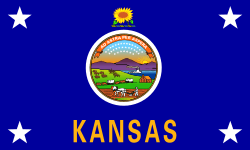Fred Hall
| Fred Hall | |
|---|---|
| 33rd Governor of Kansas | |
| In office January 10, 1955 – January 3, 1957 | |
| Lieutenant | John McCuish |
| Preceded by | Edward F. Arn |
| Succeeded by | John McCuish |
| 31st Lieutenant Governor of Kansas | |
| In office 1951–1955 | |
| Governor | Edward F. Arn |
| Preceded by | Frank L. Hagaman |
| Succeeded by | John McCuish |
| Personal details | |
| Born | July 24, 1916 Dodge City, Kansas |
| Died | March 18, 1970 (aged 53) Shawnee, Kansas |
| Political party | Republican |
| Spouse(s) | Leadell Schneider |
| Profession | attorney, judge, politician |
| Religion | Methodist |
Frederick "Fred" Lee Hall (July 24, 1916 – March 18, 1970) was a Republican lawyer and politician who served as Lieutenant Governor of Kansas, 1951–55 and the 33rd Governor of Kansas, 1955-57.
Biography
Hall was born in Dodge City and graduated from Dodge City High School where his participation on the debate team and his academic achievements earned him a scholarship to the University of Southern California. While attending U.S.C., he was a member of the International Debating Team, finished his B.A. degree in 1938, stayed on and earned his law degree.[1] He married Leadell Schneider and they had one child.
Career
During World War II, Hall enlisted and was rejected when he failed to pass his physical. From 1942 to 1944, he served as an assistant director of the Combined Production and Resources Board, coordinating production planning with Britain and Canada, and based in Washington.
Hall established his law practice in Topeka and Dodge City and served as the Ford County attorney from 1947 to 1949. Elected Lieutenant Governor of Kansas, he served from 1951 to 1955.[2]
Elected in 1954, Hall was sworn into the governorship on January 10, 1955. During his tenure, the director of the state purchasing agency was fired, a high school aid law was authorized, a water resource commission was organized, and a "right to work" bill was vetoed.[3]
Hall resigned to become a justice of Kansas Supreme Court in 1957[4] after being defeated in the primary for re-election to office, in what is known as the "triple-play of 1956". When Warren Shaw defeated Hall in the Republican primary to select the next Kansas Governor and Shaw lost the subsequent Gubernatorial general election to Democrat George Docking. Sitting Chief Justice Bill Smith – a strong supporter of Hall – was seriously ill and contemplating a retirement from his position as Chief Justice. Smith was concerned that if he retired after Docking took office in January 1957, Docking would appoint a Democrat as Chief Justice. Smith, Hall, and Lieutenant Governor John McCuish devised a plan to prevent this from happening. Chief Justice Smith resigned on December 31, 1956. Smith's resignation was quickly followed by Governor Hall's resignation on January 3, 1957. As a result of Hall's resignation, Lieutenant Governor McCuish was sworn in as Kansas Governor. The only official act of McCuish's 11-day tenure as governor was to appoint Hall as chief justice of the Kansas Supreme Court.
Hall served on the Supreme Court bench until the spring of 1958 when he resigned to again run for the governorship. Defeated in his bid, he retired from politics and moved to California where he became an executive in the management control of the Aerojet General Corporation. He returned later to Dodge City and resumed his law practice.
Death and legacy
He was a member of the Methodist Church and a member of Phi Kappa Tau Fraternity and elected to a term on the Phi Kappa Tau National Council in 1956. Hall died at Shawnee and is interred at Maple Grove Cemetery in Dodge City.[5]
References
- ↑ "Fred Hall". National Governors Association. Retrieved 3 October 2012.
- ↑ "Fred Hall". The Political Graveyard. Retrieved 3 October 2012.
- ↑ "Fred Hall". National Governors Association. Retrieved 3 October 2012.
- ↑ "Fred Hall". The Political Graveyard. Retrieved 3 October 2012.
- ↑ "Fred Hall". Find A Grave. Retrieved 3 October 2012.
External links
| Wikimedia Commons has media related to Fred Hall. |
|
